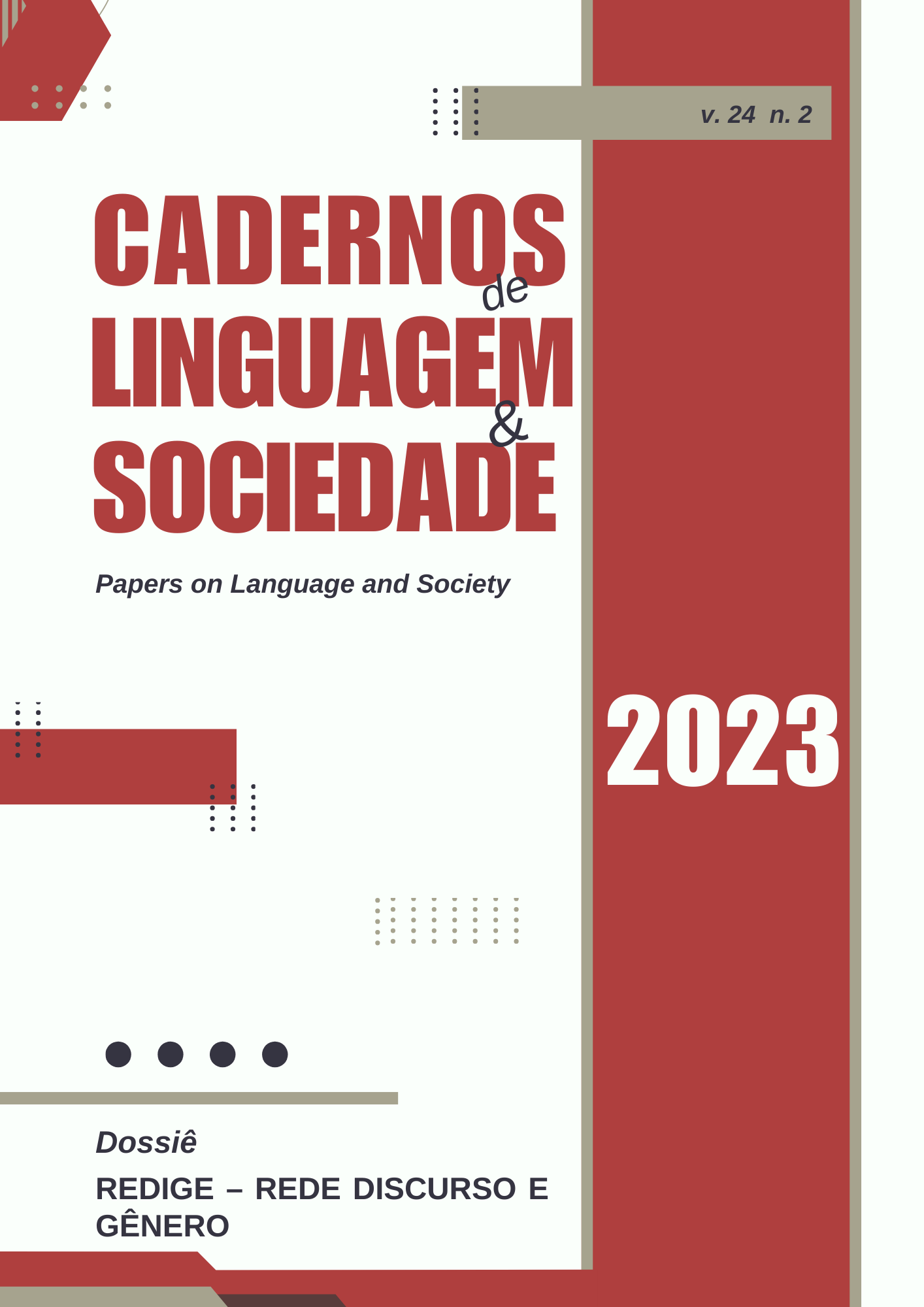Vulnerabilidad Lingüística en Escenario Digitales y Fuerzas Escalares del Hilo contra las Mujeres
DOI:
https://doi.org/10.26512/les.v24i2.50742Palabras clave:
Amenaza, Vulnerabilidad lingüística, Citación, Conducta, Escenario digitalResumen
Este artículo busca ampliar el debate sobre las relaciones entre lenguaje y conducta al discutir las condiciones de vulnerabilidad lingüística en amenazas contra mujeres en interacciones digitales y presenciales. Nuestro análisis se centra en las amenazas a la periodista Vera Magalhães durante la campaña electoral 2022. En el escenario digital, la citación de declaraciones amenazantes conduce a un crecimiento exponencial de repeticiones. La circulación promueve transformaciones de textos digitales y repeticiones muestran el “legado citacional”, ambas características sujetas a cambios de escala desde la cadena textual hasta la conducta violenta invocando un cronotopo de la historia de violencia contra mujeres.
Descargas
Citas
ANDRADE, Ana Olívia Costa de. “Contra tudo isto que está aí”: moralismo e política nas manifestações “Fora Dilma” em João Pessoa. 2016. 144 f. Dissertação (Programa de Pós-Graduação em Sociologia) - Universidade Federal da Paraíba, João Pessoa, 2016.
AUSTIN, John L. How to do things with words. London: Oxford University Press, 1962.
AUTORA 1 2021.
AUTORA 2, 2015.
BEAN, Judith. Gaining a public voice: a historical perspective on American women’s public speaking. In: BAXTER, Judith Mattson (org.). Speaking out: the female voice in public contexts. Londres: Palgrave Macmillan, 2006. p. 21–39.
BLOMMAERT, Jan. Chronotopes, Scales, and Complexity in the Study of Language in Society. Annual Review of Anthropology, v. 44, n. 1, p. 105–116, 2015.
BROWN, Wendy. Nas ruínas do neoliberalismo: A ascensão da política antidemocrática no ocidente. São Paulo: Editora Filosófica Politeia, 2019.
BUTLER, Judith. Discurso de ódio: Uma política do performativo. São Paulo: Editora da Unesp, 2021.
BUTLER, Judith. Excitable speech: A politics of the performative. New York: Routledge, 1997.
CAMERON, Deborah. Feminism and Linguistic Theory. 2. ed. Londres: Macmillan, 1992.
CAMERON, Deborah. Incidentes isolados. 2020. Disponível em: https://contxt.letras.ufrj.br/incidentes-isolados/. Acesso em: 18 ago. 2023.
CAMERON, Deborah. Verbal Hygiene. 2. ed. Abingdon: Routledge, 2012.
CAMERON, Deborah; SHAW, Sylvia. Gender, power and political speech: Women and Language in the 2015 UK General Election. Londres: Palgrave Macmillan, 2016.
CARRANZA, Isolda E. Digital first-order place, velocity and chronotope in globalized communication. In: PARINI, Alejandro; YUS, Francisco (org.). The Discursive Construction of Place in the Digital Age. New York: Rouledge, 2023. p. 47–65.
CESARINO, Letícia. O mundo do avesso: verdade e política na era digital. São Paulo: Ubu Editora, 2022.
CIBORGA, Coletiva et al. Etnografia digital: Um guia para iniciantes nos estudos da linguagem em ambientes digitais. Goiânia: Cegraf, 2022.
COLLINS, James; SLEMBROUCK, Stef. Goffman and globalization: frame, footing and scale in migration-connected multilingualism. In: COLLINS, James; SLEMBROUCK, Stef; BAYNHAM, Mike (org.). Globalization and language contact: Scale, migration, and communicative pratices. London: Continuum, 2009. p. 19–41.
GAL, Susan. A Semiotics of the Public/Private Distinction. differences, v. 13, n. 1, p. 77–95, 2002.
GOFFMAN, Erving. Footing. In: RIBEIRO, Branca Telles; GARCEZ, Pedro M. (org.). Sociolinguística interacional. 2. ed. São Paulo: Edições Loyola, 2013. p. 107–148.
HERRING, Susan C.; STOERGER, Sharon. Gender and (A)nonymity in Computer-Mediated Communication. In: EHRLICH, Susan; MEYERHOFF, Miriam; HOLMES, Janet (org.). The Handbook of Language, Gender, and Sexuality. 2. ed. Malden: Wiley Blackwell, 2014. p. 567–586.
IRVINE, Judith. When talk isn’t cheap: language and political economy. American Ethnologist, v. 16, n. 2, p. 248–267, 1989.
IRVINE, Judith; GAL, Susan. Language ideology and linguistic differentiation. In: KROSKRITY, Paul (org.). Regimes of Language: ideologies, polities and identities. Santa Fé: School of American Research Press, 2000. p. 35–84.
KROSKRITY, Paul. Language ideologies. In: DURANTI, Alessandro (org.). A Companion to Linguistic Anthropology. Malden: Blackwell, 2004. p. 496–517.
LITOSSELITI, Lia. Constructing gender in public arguments: the female voice as emotional voice. In: BAXTER, Judith (org.). Speaking out: the female voice in public contexts. Londres: Palgrave Macmillan, 2006. p. 40–58.
MCELHINNY, Bonnie. Theorizing Gender in Sociolinguistics and Linguistic Anthropology: Toward Effective Interventions in Gender Inequity. In: EHRLICH, Susan; MEYERHOFF, Miriam; HOLMES, Janet (org.). TheHandbook of Language, Gender, and Sexuality. 2. ed. Malden, MA: Blackwell Publishing Ltd, 2014. p. 48–67.
OCHS, Elinor. Indexing gender. In: DURANTI, Alessandro; GOODWIN, Charles (org.). Rethinking context: Language as an interactive phenomenon. Cambridge: Cambridge University Press, 1992. p. 335–358.
POSETTI, Julie et al. The chilling: global trends in online violence against women journalists. Unesco, 2021.
PRATT, Mary Louise. Utopias Linguísticas. Trabalhos em Linguística Aplicada, v. 52, n. 2, p. 437–459, 2013.
SANQUE, Douglas Roberto Knupp. “Pela família”; Múltiplas indexicalidades do signo “família” na comunicação do impeachment de Dilma Roussef. 2020. 289 f. Tese (Doutorado Interdisciplinar em Linguística Aplicada) - Universidade Federal do Rio de Janeiro, Rio de Janeiro, RJ, 2020.
SILVA, Daniel; ALENCAR, Claudiana de. Violência e significação: uma perspectiva pragmática. In: SILVA, Daniel; FERREIRA, Dina; ALENCAR, Claudiana de (org.). Nova Pragmática: Modos de fazer. São Paulo: Cortez, 2014. p. 259–282.
SILVERSTEIN, Michael. Indexical order and the dialectics of sociolinguistic life. Language and Communication, v. 23, n. 3–4, p. 193–229, 2003.
VARIS, Piia. Digital ethnography in the study of language, gender, and sexuality. In: ANGOURI, Jo; BAXTER, Judith (org.). The Routledge handbook of language, gender, and sexuality. New York: Routledge, 2021. p. 164–177.
VARIS, Piia; BLOMMAERT, Jan. Conviviality and collectives on social media: Virality, memes, and new social structures. Multilingual Margins, v. 2, n. 1, p. 31–45, 2015.
Descargas
Publicado
Cómo citar
Número
Sección
Licencia
Derechos de autor 2023 Cadernos de Linguagem e Sociedade do Programa de Pós-Graduação em Linguística da UnB é licenciado sob uma Licença Creative Commons Atribuição-Uso não-comercial-Vedada a criação de obras derivadas 3.0 Unported.

Esta obra está bajo una licencia internacional Creative Commons Atribución 4.0.
Autores/as que publicam nesta revista concordam com os seguintes termos:
Autores/as mantêm os direitos autorais e concedem à revista o direito de primeira publicação, sendo o trabalho simultaneamente licenciado sob a https://creativecommons.org/licenses/by-nc-nd/4.0/o que permite o compartilhamento do trabalho com reconhecimento da autoria do trabalho e publicação inicial nesta revista.


